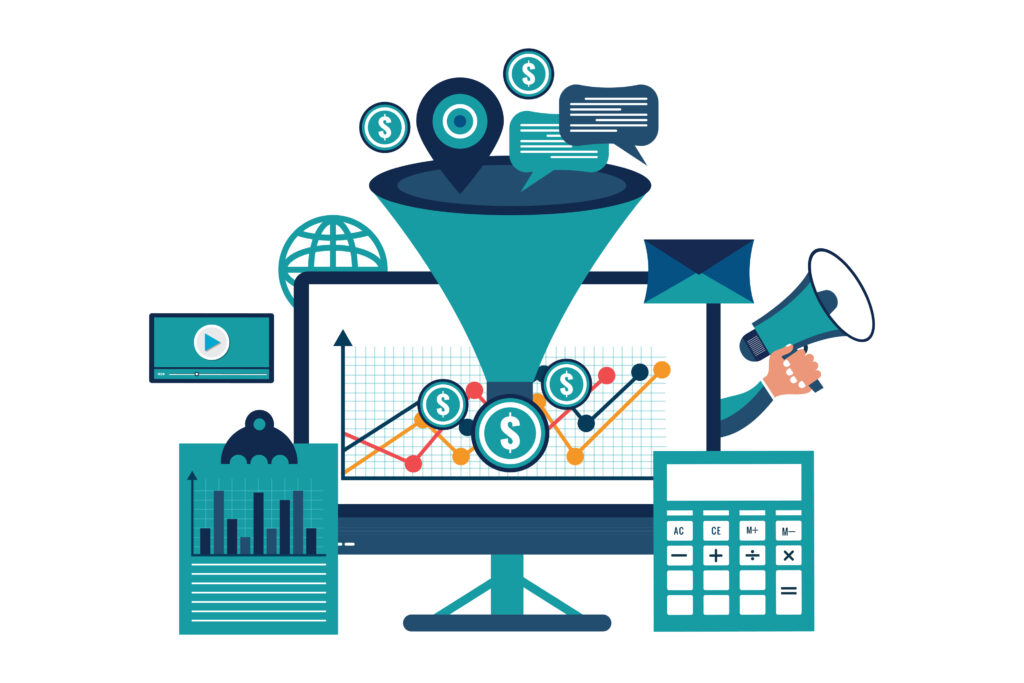Ever wondered why some businesses thrive while others struggle? It’s all about the sales funnel, a crucial concept that could be the game-changer for your venture.
You’ve probably heard the term, but do you really know what it means? In this article, we’re going to demystify sales funnels for you. We’ll explain why they’re so important and how they can help you turn leads into loyal customers. You’ll learn about the benefits, potential pitfalls, and see real-world examples.
By the end, you’ll have a clear understanding of sales funnels and how to use them to your advantage.
So, are you ready to boost your sales and grow your business? Let’s dive in!
Understanding the Concept – Why is a Sales Funnel Important
Without a doubt, a sales funnel isn’t just a fancy business lingo, it’s the lifeblood of your company – the very heartbeat that keeps your business alive and thriving. But what is a sales funnel exactly?
In essence, it’s a step-by-step process that guides potential customers from their first interaction with your brand to the moment they become loyal customers.
Understanding this concept is crucial for your success. Why? Because a sales funnel helps you visualize and understand the journey your customers take. It gives you insights into where in the funnel your prospects are dropping off, allowing you to fine-tune your strategies.
With a sales funnel, you’re not just shooting in the dark, hoping to hit the target. Instead, you’re meticulously planning and executing strategies that will lead your prospects right to your doorstep. It helps you focus your marketing efforts, ensures a better conversion rate, and ultimately drives your business growth.
So, don’t underestimate the power of a well-defined sales funnel. It’s not an option, it’s a necessity. It’s a fundamental part of your business strategy that you must master if you want to stay ahead of the competition.
A clear understanding of the sales funnel concept can make a significant difference in your business’s success.

Their Benefits
Harnessing the power of this strategic process can dramatically increase your conversion rates, turning curious onlookers into loyal customers. Sales funnels offer a plethora of benefits that streamline your selling process and maximize your overall sales performance. They play a pivotal role in guiding potential buyers through the decision-making process, leading to a boost in conversions.
Consider the following benefits of a well-constructed sales funnel:
- Increased Sales and Profitability: By leading customers through a tailored journey, you can effectively upsell or cross-sell your products, increasing your sales volume and profitability.
- Improved Customer Retention: A sales funnel can help nurture customer relationships, leading to higher customer satisfaction and retention.
- Predictable Sales Volume: With a sales funnel, you can predict and plan your sales volume, enhancing your business stability.
- Efficient Lead Qualification: Through a funnel, you can identify and focus efforts on high-quality leads, saving time and resources.
So, as you can see, sales funnels provide an effective and efficient way to drive your sales forward. They not only help you understand customer behavior but also enable you to tailor your selling strategy to meet their specific needs. As a result, you’ll see a notable improvement in your sales performance, customer retention, and ultimately, your bottom line.
Potential Pitfalls

While reaping the benefits, you must also remain vigilant of potential pitfalls that might trip up your well-oiled machine. Sales funnels are not immune to challenges.
One of the most common pitfalls is the lack of a clear, well-thought-out strategy. Without this, you’re essentially flying blind, and your sales funnel can quickly become a chaotic mess.
Another pitfall is neglecting your customer’s journey. Remember, your funnel should guide your potential customers from awareness to purchase. If you’re too focused on the end game (the sale), you might not provide the necessary nurturing and engagement at each stage, leading to lost opportunities.
Don’t underestimate the power of analytics either. Ignoring the data can lead to misinformed decisions and wasted resources. It’s crucial to monitor and assess the performance of your funnel, tweaking it as necessary.
Beware of these pitfalls. By doing so, you’ll ensure your sales funnel is not just a strategy, but a powerful, efficient tool in your business arsenal. So, while it’s essential to understand the benefits of a sales funnel, it’s equally important to recognize and mitigate the potential risks. Keep your eyes open, and your funnel will remain an asset, not a liability.
Sales Funnel Examples
Now, let’s delve into some real-world examples to give you a clearer picture of how this strategy can be implemented effectively.
1. The E-commerce Store: An online retailer first attracts visitors to their site, often through social media or Google ads. They nurture these leads by offering an initial discount code in exchange for an email address. After that, the customers are guided down the funnel with personalized emails promoting products based on their browsing history.
2. The Software-as-a-service (SaaS) Company: SaaS businesses often provide a free trial to potential customers. Once the trial ends, they use email marketing to nurture these leads, offering upgraded features and benefits of their paid version.
3. The Fitness App: Many fitness apps offer a free version with limited features. To convert users into paying customers, they highlight the benefits of their premium version, often through in-app notifications and emails.
4. The Coaching Business: Personal coaches often provide free content, like blog posts or webinars, to attract potential clients. They then offer a free consultation to discuss their services in more detail, eventually converting these leads into paying clients.
These examples illustrate how a sales funnel can be tailored to your business model and audience needs. Remember, the key lies in creating a smooth and enticing journey to lead your potential customers from awareness to the decision stage.
Conclusion
In closing, it’s essential to remember that the success of your enterprise hinges on your ability to effectively guide your potential customers from the first point of contact to the decision-making stage. A sales funnel isn’t just a tool—it’s the strategic roadmap of your customer’s journey. Understanding it can empower your business by helping you identify where leads are in their buying process, so you can respond with the right tactics at the right time.
A well-structured sales funnel will not only attract and retain customers, but also convert them into repeat buyers. Tailoring your strategies for each stage of the funnel can significantly increase your conversion rates, driving more profit for your business. Remember, your potential customers are on a journey, and it’s your job to guide them through it.
Mastering the art of the sales funnel is a crucial aspect of running a successful business. It’s about more than just making a sale—it’s about nurturing relationships, understanding customer behavior, and strategically guiding your customers towards making a decision. Don’t underestimate the power of a well-executed sales funnel—it could be the key to unlocking unprecedented growth for your business.
So, why wait? Start crafting your unique funnel today!
Frequently Asked Questions

How much time does it typically take to set up an effective sales funnel?
Setting up an effective sales funnel isn’t a quick task. It typically takes several weeks to months, depending on complexity and resources. It’s a strategic process requiring market research, planning, and consistent optimization.
Can a business have more than one sales funnel?
Absolutely! Your business can definitely have multiple sales funnels. Each product, service, or customer segment might require its own funnel. This allows for more personalized, effective marketing strategies to drive sales.
What role does technology play in developing one?
Technology aids in developing your sales funnel by automating processes, providing analytics for decision-making, and facilitating customer engagement. It helps streamline operations, enables tailored marketing strategies, and ultimately boosts your conversion rates.
How does it differ from a marketing funnel?
While a marketing funnel focuses on generating awareness and attracting leads, a sales funnel is more about converting these leads into customers. It’s your job to nurture those leads and close the deal.
How often should a sales funnel be evaluated and updated?
You should evaluate and update your sales funnel regularly. Ideally, review it monthly or quarterly. This ensures it’s in line with market trends, customer behavior changes, and your evolving business goals. Stay ahead, stay updated.
Want to read more interesting facts about sales funnels and other related topics?

